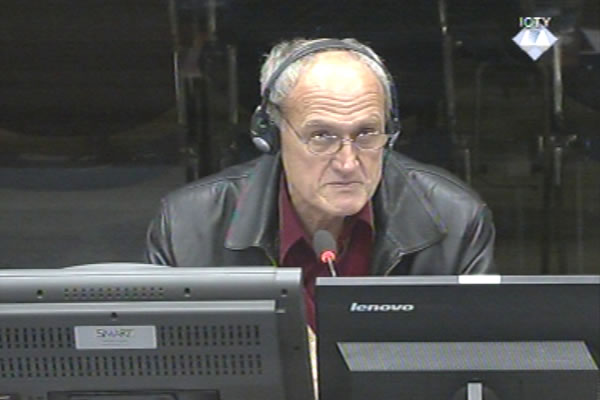Home
KVOCKA DENIES CRIMES IN OMARSKA
Radovan Karadzic continues building his defense case through the evidence of various persons convicted by the Tribunal. Now he has called Miroslav Kvocka, former guard from Omarska. Kvocka claimed that killings and beatings were not a rule but an exception in the prison camp, or at least, that was the case in the first 20 days he worked as a guard there. According to Kvocka, his job in the prison camp ended abruptly after he tried to save three Muslim cousins from detention
 Miroslav Kvocka, witness at the Radovan Karadzic trial
Miroslav Kvocka, witness at the Radovan Karadzic trial Former deputy guard commander in the Omarska prison camp in Prijedor, Miroslav Kvocka is one of a series of Radovan Karadzic’s defense witnesses who have all been convicted by the Tribunal. Kvocka was sentenced to seven years for crimes against the prisoners in Omarska. Having served two thirds of the sentence in the UN Detention Unit in Scheveningen, Kvocka was granted early release without spending a single day in a real prison.
In the statement to the defense team, read out by the accused, Kvocka said that Omarska was an ‘investigation center’ where rights of the detainees were respected. There were only a couple of incidents and Kvocka blamed them on the special unit personnel from Banja Luka and local Serbs. They entered the prison camp and attacked Muslims in revenge, Kvocka explained. The guards were given strict instructions not to touch the detainees who had been brought there in order to be investigated for their purported involvement in the armed conflict. Kvocka claimed that the center in Omarska was not surrounded by a wire fence and the food was distributed regularly. From time to time, Kvocka said, he personally brought sandwiches to the detainees. In Kvocka’s words, the investigators didn’t abuse the prisoners: only occasionally would they ‘raise their voice’ during the interrogation. Kvocka also stated that he never aided any murders and ‘just heard rumors’ about cases of abuse.
At the beginning of her cross-examination, prosecutor Sutherland highlighted the differences between Kvocka’s testimony and the findings in the judgment that found him guilty of persecution and complicity in murder and abuse. The prosecutor didn’t contest the witness’s claim that he had taken three of his Muslim wife’s brothers from the prison camp and brought them to a nearby family home. Kvocka did it because he knew about the bad conditions in the prison camp and in particular about the risk that they might be beaten or killed, the prosecutor suggested. Kvocka agreed in part with the prosecutor, saying that the conditions were ‘not commendable’. The prosecutor went on to remind Kvocka of his evidence at his own trial, when he said he was afraid that ‘something stupid would happen to them’, i.e, that they might end up being killed or tortured.
The witness was soon ordered to bring back his wife’s brothers to the prison camp and he was transferred to the police station in Omarska. This happened in mid-June 1992, after he spent about 20 days as a guard. This probably saved Kvocka from receiving a harsher sentence by the Tribunal.
Kvocka was adamant that only five or six prisoners were killed while he worked in the camp. He did admit that he personally witnessed abuse on several occasions. Also, Kvocka heard stories about guards and investigators beating up the detainees. Kvocka saw that some of the detainees were injured. However, according to Kvocka, only two or three guards ‘didn’t do things the usual way’ and he was not authorized to report crimes. Asked if he knew of a single official investigation of the crimes in Omarska, the witness replied, ‘nobody told me anything about it, and I didn’t have the right to ask’.
It was interesting to hear Kvocka’s reply to the question about the expulsions of civilians from the Prijedor municipality: he said that the authorities didn’t pressure the non-Serbs, but ‘the exact opposite was the case’, as the non-Serbs went to the authorities asking them to help them go abroad through the Red Cross.
The next witness is Dragan Radetic, who worked as an investigator in Keraterm, the second of the three large prison camps in the Prijedor area.
Linked Reports
- Case : Karadzic
- 2014-01-17 AVENGER OR JUST OBSERVER
- 2014-01-16 ‘VOLUNTARY DEPORTATION’
- 2014-01-16 ‘STRONG’ EVIDENCE THAT SERBS ARE NOT RESPONSIBLE FOR MARKALE 2
- 2014-01-21 INVESTIGATOR AND PRIJEDOR ‘GRAPEVINE’
- 2014-01-21 KARADZIC’S WITNESSES TOOK ACTIVE PART IN PRIJEDOR EVENTS
- 2014-01-22 BEARA BLAMES RS POLICE FOR SREBRENICA
